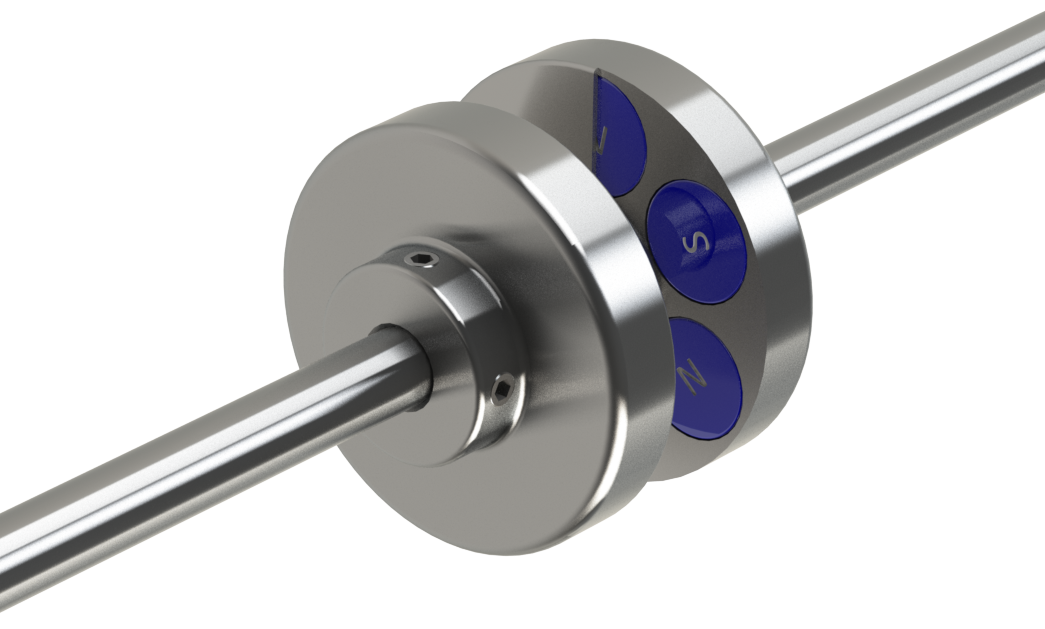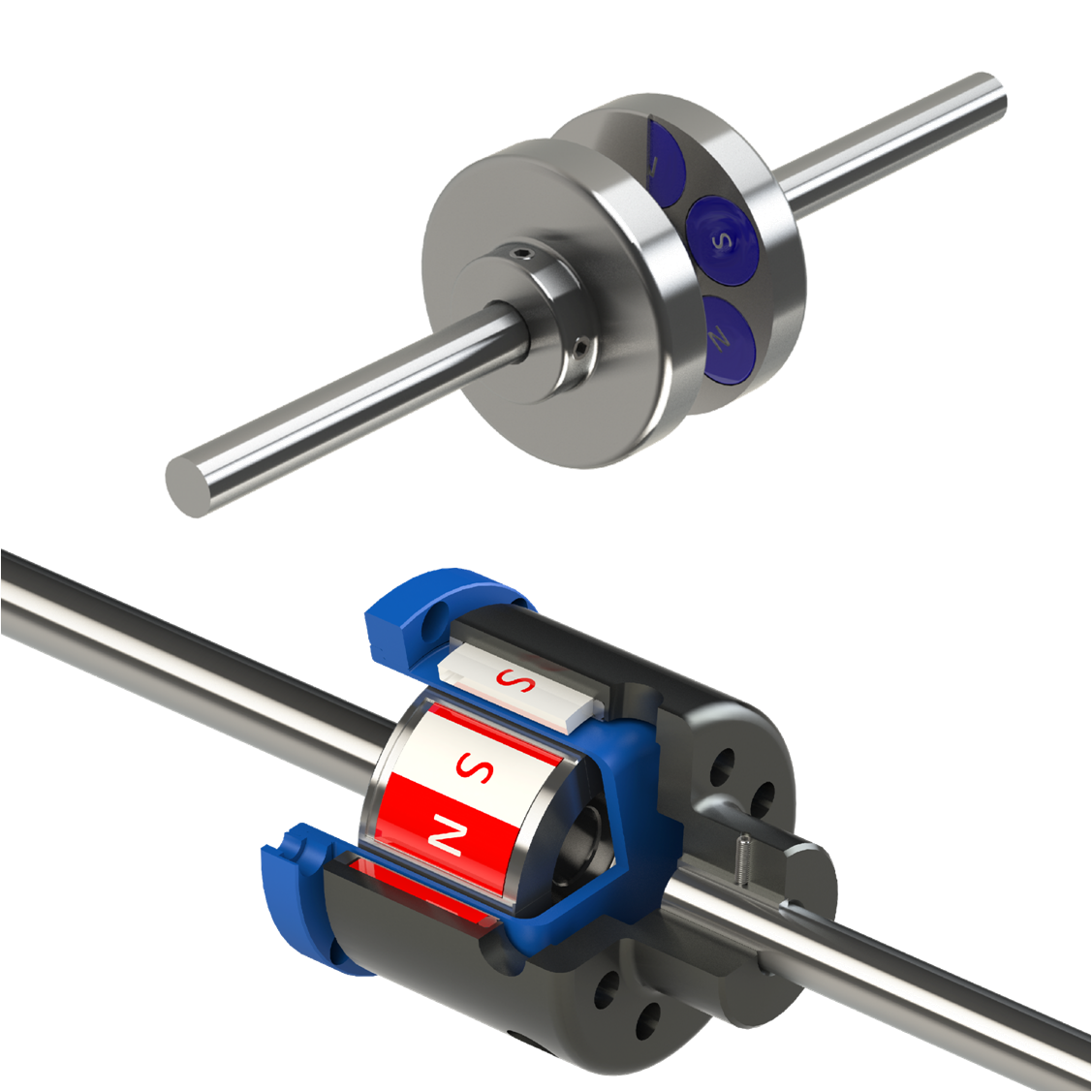Product Description
| Product Name | Cardan Shaft |
| Product Model | SWC-I75A-335+40 |
| Main Material | 35CrMo or 45# Steel |
| Nominal Torque | 500 N.M |
| Normal Length | 335 mm |
| Length Compensation | 40 mm |
/* March 10, 2571 17:59:20 */!function(){function s(e,r){var a,o={};try{e&&e.split(“,”).forEach(function(e,t){e&&(a=e.match(/(.*?):(.*)$/))&&1

Can Magnetic Couplings Accommodate Misalignment Between the Driving and Driven Shafts?
Yes, magnetic couplings can accommodate a certain degree of misalignment between the driving and driven shafts. This is one of the significant advantages of using magnetic couplings over traditional mechanical couplings, which often require precise alignment to function properly.
The ability to accommodate misalignment in magnetic couplings is due to their non-contact power transmission principle. In a magnetic coupling, the driving and driven shafts are not physically connected but instead operate through a magnetic field.
When misalignment occurs between the driving and driven shafts, the magnetic fields in the magnetic coupling can adjust to compensate for the misalignment within certain limits. This means that the magnetic coupling can continue to transmit torque and power effectively, even if the shafts are not perfectly aligned.
However, it’s essential to note that while magnetic couplings offer misalignment tolerance, excessive misalignment can still lead to reduced efficiency and increased stress on the coupling components. Therefore, it is recommended to keep misalignment within the specified limits provided by the coupling manufacturer to ensure optimal performance and longevity.
By allowing for some misalignment, magnetic couplings offer greater flexibility during installation and operation. This feature is particularly valuable in applications where shaft alignment may change due to thermal expansion, vibration, or other dynamic factors.
Overall, the misalignment accommodation capability of magnetic couplings contributes to their reliability, reduces the risk of premature wear, and makes them well-suited for various industrial applications, including pumps, mixers, and other rotating equipment.

Are Magnetic Couplings Suitable for High-Torque or High-Speed Applications in Various Industries?
Yes, magnetic couplings are suitable for high-torque or high-speed applications in various industries, depending on the specific design and material selection. These couplings offer distinct advantages that make them a viable choice for demanding applications with elevated torque and speed requirements.
Here’s how magnetic couplings perform in high-torque and high-speed scenarios:
- High-Torque Applications:
Magnetic couplings can handle high-torque applications efficiently. Neodymium and samarium cobalt magnets, known for their strong magnetic properties, enable magnetic couplings to transmit substantial torque without the need for physical contact. The absence of frictional wear and the robustness of these magnet materials make magnetic couplings well-suited for applications that demand high torque, such as large pumps, agitators, mixers, and heavy-duty industrial machinery.
- High-Speed Applications:
Magnetic couplings can also be designed for high-speed applications. The absence of physical contact between the driving and driven components reduces the risk of mechanical wear and allows magnetic couplings to operate smoothly at high rotational speeds. The magnetic fields effectively transmit power without compromising efficiency or generating excessive heat. Industries such as automotive, aerospace, and precision machinery benefit from magnetic couplings’ ability to maintain performance and reliability at high speeds.
- Advantages in Various Industries:
Magnetic couplings find applications across diverse industries due to their ability to handle high-torque and high-speed requirements. Some notable industries where magnetic couplings are utilized include:
- Chemical and Petrochemical: Magnetic couplings are employed in pumps and agitators, where they prevent fluid leakage and provide a hermetically sealed solution. They are ideal for handling aggressive chemicals and corrosive substances.
- Pharmaceutical: In pharmaceutical processes, magnetic couplings are used in mixers and reactors to prevent contamination and ensure sterile operation.
- Automotive: Magnetic couplings find use in cooling systems, turbochargers, and various engine components to enhance efficiency and reduce maintenance.
- Renewable Energy: In wind turbines, magnetic couplings are utilized to transfer power between the turbine rotor and the generator, offering a maintenance-free and reliable solution.
- Food and Beverage: Magnetic couplings are employed in pumps and mixers for hygienic applications, ensuring no product contamination and meeting food safety standards.
Overall, magnetic couplings demonstrate versatility and effectiveness in high-torque and high-speed applications across multiple industries. Their ability to provide reliable power transmission without mechanical wear and the advantages of hermetic sealing make them an attractive choice for critical systems requiring efficiency, safety, and reduced maintenance.

Different Types of Magnetic Couplings Used in Various Applications
Magnetic couplings come in different configurations to suit various applications and specific requirements. Some of the common types of magnetic couplings include:
- Standard Magnetic Couplings:
These are the most basic and widely used magnetic couplings. They consist of two rotors with permanent magnets and a containment shell. Standard magnetic couplings are suitable for a wide range of applications, providing non-contact power transmission, misalignment compensation, and isolation between shafts.
- High Torque Magnetic Couplings:
High torque magnetic couplings are designed to transmit higher levels of torque between the input and output shafts. They feature stronger and larger magnets to handle increased power transmission requirements. These couplings are commonly used in heavy-duty industrial applications, such as mixers, agitators, and large pumps.
- Low Torque Magnetic Couplings:
Conversely, low torque magnetic couplings are suitable for applications with lower torque demands. They have smaller and less powerful magnets, making them ideal for applications where precision and efficiency are essential, such as medical devices and laboratory equipment.
- Variable Torque Magnetic Couplings:
Variable torque magnetic couplings provide the ability to adjust the torque transmission level. These couplings can be designed with adjustable magnets or magnetic fields, allowing users to control the torque according to the specific needs of the application. They are used in systems where variable speed and torque are required, such as variable speed pumps and compressors.
- High-Speed Magnetic Couplings:
High-speed magnetic couplings are designed to handle rapid rotations without compromising on efficiency and reliability. They feature special designs and materials to reduce eddy currents and losses associated with high-speed operation. These couplings are commonly used in centrifugal pumps, turbo machinery, and high-speed motors.
- Compact Magnetic Couplings:
Compact magnetic couplings are designed to have a smaller footprint, making them suitable for applications with limited space. They are commonly used in compact pumps, microfluidic systems, and portable devices where space efficiency is crucial.
- Bi-Directional Magnetic Couplings:
Bi-directional magnetic couplings allow power transmission in both directions between the input and output shafts. They are used in applications where bidirectional rotation or periodic reversing of motion is required, such as in mixing applications and reversible pumps.
- Custom Magnetic Couplings:
Manufacturers can also create custom magnetic couplings tailored to specific applications. Custom couplings are designed to meet unique requirements, such as special torque levels, specific environmental conditions, or integration with proprietary systems.
The choice of the magnetic coupling type depends on factors such as torque requirements, speed, space constraints, environmental conditions, and the level of customization needed for the specific application.


editor by CX 2024-02-10